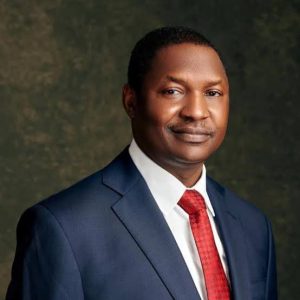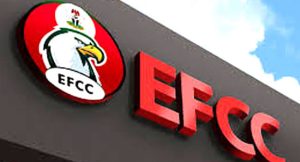AGF Malami Terminates Trial of Dasuki’s Ex-aide After Taking Over From EFCC

The Attorney-General of the Federation, Abubakar Malami, on Tuesday, terminated the N1.84 billion corruption charges filed against Nicholas Ashinze, a former military assistant to then National Security Adviser (NSA), Sambo Dasuki, and eight others.
Mr Malami Abubakar, who has less than one month to stay in office, swiftly withdrew the case at the Federal High Court in Abuja, immediately after taking over the trial from the Economic and Financial Crimes Commission (EFCC) on Tuesday.
The lawyer who represented him in court, David Kaswe, gave no reason for the move.
The EFCC had called seven prosecution witnesses in the trial that started over five years ago. The commission was to proceed with hearing when a lawyer from the AGF office, Mr Kaswe, announced Nigeria’s chief law officer’s decision to take over the case.

EFCC Nigeria
The News Agency of Nigeria (NAN) reports that EFCC’s counsel, Offem Uket, said he was unaware that the AGF was taking over the matter. He, however, did not oppose the application.
After obtaining the judge’s permission to take over the suit, Mr Kaswe prayed for the withdrawal of the criminal charge against the defendants.
It has become customary of the AGF office on the watch of Mr Malami to terminate EFCC’s cases once it takes over such criminal proceedings. The office does this in exercise of the AGF’s constitutional power to take over and institute a nolle prosequi (terminate trials).
The EFCC, which is under some supervisory control of the AGF, hardly opposes such move even when it is uncomfortable with it.
The office controversially withdrew the corruption charges against a former Gombe State governor, Danjuma Goje, in 2019, based on what was widely believed to be political considerations. Mr Malami justified the move in an interview with PREMIUM TIMES in January this year.
Terminated case
Mr Dasuki was the NSA to former President Goodluck Jonathan. He is also standing trial on charges of diversion of funds meant for procurement of arms.
His former aide, Mr Ashinze (1st defendant) was standing trial alongside an Austrian, Wolfgang Reinl; Edidiong Idiong and Sagir Mohammed listed as 2nd to 4th defendants respectively.
Other defendants in the case were five companies: Geonel Integrated Services Limited, Unity Continental Nigeria Limited, Helpline Organisation, Vibrant Resource Limited and Sologic Integrated Service Limited listed as 5th to 9th defendants respectively.
The amended charge of 13 counts of money laundering, dated 3 October 2017, was filed on 6 October 2017.
The defendants were re-arraigned by the EFCC in 2018.
The various money laundering offences alleged by the EFCC involved transfer and taking possession of a total of N1,840,000,000 which it described as proceeds of unlawful acts.
The funds allegedly emanated from the office of the former NSA where Mr Ashinze served as special assistant to Mr Dasuki, the then NSA.
The commission said all the defendants conspired to commit money laundering offences contrary to section 18(a) of the Money Laundering (Prohibition) Act, 2011, and punishable under section 15(3) and (4) of the same law.
It alleged in counts 2 to 7 that Mr Ashinze; the Austrian, Mr Reinl, and Reinl’s Geonel Integrated Services Limited corruptly transferred various sums of money, totalling N1.84 billion to Mr Idiong, Mohammed, Sologic Integrated Services Limited, Vibrant Resource Limited and Helpline Organisation.
It alleged that the transfer of the funds on 22, 23, and 24 April, and 5 May, 2014, violated the provisions of section 15(2)(b) of Money Laundering (Prohibition) Act and punishable under section 15(3) and (4) of the same law.
The prosecution in counts 8 to 13 accused Messrs Idiong and Mohammed, Sologic Integrated Services Limited, Vibrant Resource Limited and Helpline Organisation of “taking possession” of the various sums of money totalling N1.84bn when they “reasonably ought to know” that the funds were proceeds of “unlawful acts”.
Mr Idiong, a lawyer practising under the name, Law Partners & Associates, allegedly received N550 million and N450 million making N1billion, on 22 April, and 5 May 2014, respectively.
Mr Mohammed, a retired lieutenant colonel and Managing Director of Unity Continental Nigeria Limited, allegedly received N120 million on 22 April 2014.
Sologic Integrated Services Limited was said to have received N120 million on 23 April 2014.
Sologic Integrated Services Limited was said to have received N120 million on 23 April 2014.
Vibrant Resource Limited allegedly received N100 million on 23 April 2014 and Helpline Organisation was said to have received N500 million on 24 April 2014.
Their alleged “taking possession” of the funds when they “reasonably ought to know” that they were proceeds of unlawful acts was said to be contrary to section 15(2)(d) of the Money Laundering (Prohibition) Act, 2011 and punishable under section 15(3) of the same Act.
The defendants pleaded not guilty to all the counts preferred against them.
Hearing
Upon resumed trial on the matter on Tuesday, Mr Kaswe, who appeared for the AGF, informed the court that he had the authority of Mr Malami to take over the case.
The lawyer said this was in accordance with Section 174(1)(a) and (c) of the Nigerian Constitution (as amended).
EFCC’s counsel, Mr Uket, said he was not aware of the move by the AGF office to take over the case. He did not oppose the application.
The judge, Okon Abang, granted the request by the AGF office to take over the case.
Mr Kaswe then prayed for the withdrawal of the criminal charge against the defendants.
Lawyers to the defendants – Afam Osigwe, a Senior Advocate of Nigeria (SAN); Patrick Agu, Anita Isato, did not oppose Mr Kaswe’s application.
But they urged the court to make a consequential order of discharging and acquitting their clients of the 13 counts.
Mr Osigwe, who appeared for the Australian national (2nd defendant), 5th, 4th and 6th defendants, argued that considering the facts and circumstances surrounding the case and taking the number of years the defendants had spent defending themselves into consideration, he prayed the court not only to discharge them but acquit them of the charges.
He cited Section 108(3) of the Administration of Criminal Justice Act (ACJA), 2015 which stipulates that the court can, in its exercise of its powers, acquitted the defendant of a charge if satisfied with the merit of a case after withdrawal.
The senior lawyer urged the court to do justice to the matter by acquitting the defendants not only to assuage their feelings but to redeem their damaged reputations.
Such an order of acquittal will show that the Nigerian justice system is one that gives justice to all,” he said.
Other defence lawyers alligned with Osigwe’s submission.
On his part, Mr Kaswe disagreed with the defence request.
“We are opposed to consequential order of acquittal,”
He cited Section 108(1) of the ACJA 2015 as a ground for the withdrawal of the charge against the defendants.
He said under Section 108 (1) of ACJA 2015, the court was also given the discretionary powers to either discharge and acquit the defendants or rather discharge them of the charge after taking into consideration the overall circumstance of the case.
“We pray that the defendants be discharged and not acquitted,” he said.
Ruling, Mr Abang held that the matter was a very simple issue that was not difficult to resolve by the court
According to him, the prosecution had not close their case at the stage the application for withdrawal of the case was made.
The judge said that the seventh prosecution witness was still in the witness box testifying and yet to be cross-examined when the application was made.
He said since the prosecution had not closed their case and the defendants called upon to enter their defence, it would be unlawful to discharge and acquit the defendants of the charge.
He held that counsel for the defendants did not consider Section 108(2) of ACJA 2015 in making their application.
Mr Abang further held that based on Section 108(3) of ACJA cited by Mr Osigwe, it was not mandatory that a court must make a consequential order to discharge and acquit defendants when a prosecution withdrew a charge.
“It is at the discretion of the court, I do hold,” he said.
Mr Abang advised that National Assembly should revisit Section 108(3) of ACJA in the overall interest of justice.
“It is my view that Section 108(3) of ACJA is poor legislative drafting,” he said.
He said Section 108(3) is in conflict with Section 108(2a) and (b) of ACJA.
He said section 108(2b) talked about the acquittal of defendants if application for withdrawal was made after the defendants had been directed to enter their defence while Section 108(3) talked about acquittal of defendants if the court was satisfied.
“The court cannot be satisfied on the merit of the case except the prosecution closed their case and the defendants testified in their defence and called their witnesses,” he said
The judge, who struck out the amended charge, only discharged all the nine defendants of the charge. (NAN)
=============
For More News Join Our WhatsApp Group With This Link: https://chat.whatsapp.com/CdPVxGOPHCI5Kd4ALZduZ7